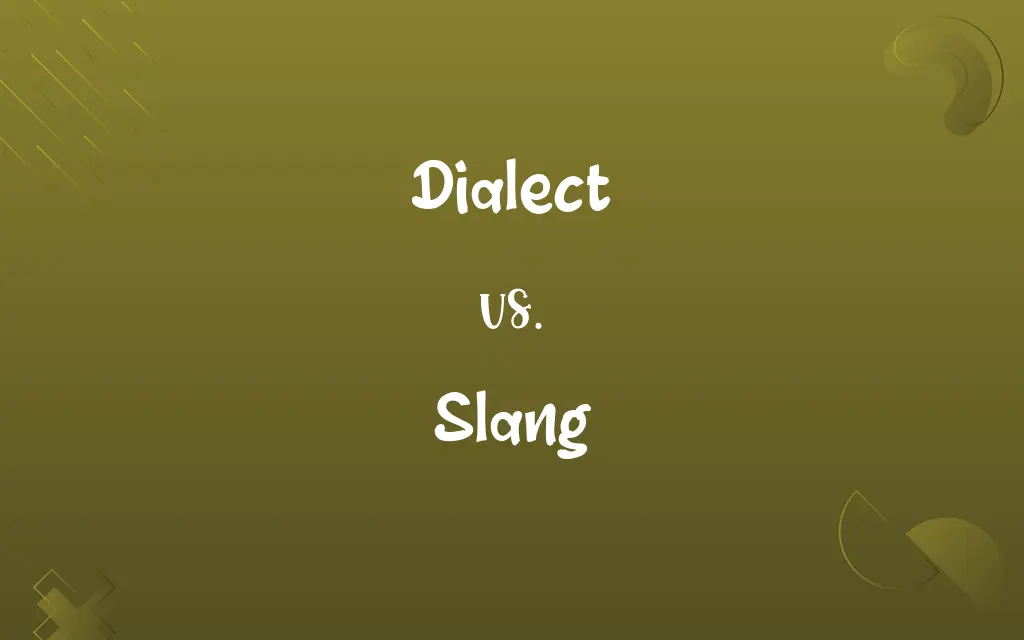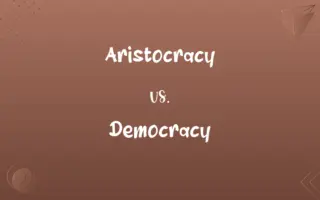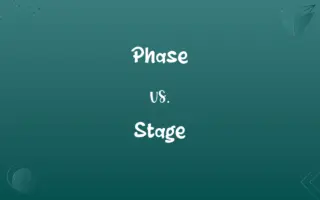Dialect vs. Slang: Know the Difference

By Shumaila Saeed || Updated on December 25, 2023
Dialect is a regional or social variety of a language with distinct vocabulary, pronunciation, and grammar. Slang is informal, often inventive language used within a particular social group or culture.

Key Differences
Dialect refers to a form of a language that is specific to a particular region or social group, exhibiting unique features in vocabulary, grammar, and pronunciation. Slang, on the other hand, is a type of language that is used informally, characterized by newly coined expressions or existing words used with new meanings, often confined to particular social groups or contexts.
Shumaila Saeed
Dec 07, 2023
While a dialect is a complete system of language with its own systematic grammar and vocabulary, it often shares the core characteristics of the larger language it belongs to. Slang, however, typically involves specific words or phrases and does not encompass a complete language system. Slang terms are often transient, emerging and fading with changes in cultural and social trends.
Shumaila Saeed
Dec 07, 2023
Dialects can be understood as legitimate variations of a language, often studied in the field of sociolinguistics for insights into regional and social linguistic diversity. Slang, conversely, is not a language variation but a set of colloquial terms that are used optionally within a language, frequently evolving and sometimes seen as subverting standard language norms.
Shumaila Saeed
Dec 07, 2023
The use of a dialect can convey a speaker’s regional background or social identity and is often a natural part of a speaker's linguistic repertoire from a young age. In contrast, slang is more about choice and group identity, often adopted by speakers to signal inclusion in a particular social or age group, and can be picked up at any stage of life.
Shumaila Saeed
Dec 07, 2023
Dialects are often recognized and studied in academic and linguistic contexts, reflecting the historical and geographical diversity of a language. Slang, however, is more often associated with pop culture, youth language, and subcultures, and is typically underrepresented in formal language education.
Shumaila Saeed
Dec 07, 2023
ADVERTISEMENT
Comparison Chart
Definition
A regional or social variation of a language.
Informal, nonstandard language expressions.
Shumaila Saeed
Dec 07, 2023
Grammar
Has distinct grammatical rules.
Does not follow specific grammatical rules.
Shumaila Saeed
Dec 07, 2023
Stability
Relatively stable over time.
Changes rapidly with trends and social groups.
Shumaila Saeed
Dec 07, 2023
Usage
Used by a community or region.
Used by specific groups, often informally.
Shumaila Saeed
Dec 07, 2023
Standardization
May have written standards in some contexts.
Rarely standardized, varies widely.
Shumaila Saeed
Dec 07, 2023
ADVERTISEMENT
Dialect and Slang Definitions
Dialect
A regional variety of a language distinguished by pronunciation, grammar, and vocabulary.
In the Southern dialect, 'y’all' is a common plural pronoun.
Shumaila Saeed
Dec 07, 2023
Slang
Informal language used by a particular group of people.
‘Lit’ is slang for something exciting or excellent.
Shumaila Saeed
Dec 07, 2023
Dialect
A subset of a language with its own phonetic, lexical, and grammatical characteristics.
The dialect of Quebec French differs significantly from that of Metropolitan French.
Shumaila Saeed
Dec 07, 2023
Slang
A type of language consisting of words and phrases that are regarded as very informal.
‘Binge-watch’ is a slang term for watching many episodes of a TV series in rapid succession.
Shumaila Saeed
Dec 07, 2023
Dialect
A language variation indicative of a user's social or regional background.
Her dialect had a distinct Midwestern twang.
Shumaila Saeed
Dec 07, 2023
ADVERTISEMENT
Slang
Language used by particular groups that are often not understood by outsiders.
In gamer slang, ‘noob’ refers to a new or inexperienced player.
Shumaila Saeed
Dec 07, 2023
Dialect
A linguistic variety that differs from the standard language.
His use of 'aye' for 'yes' revealed his Scottish dialect.
Shumaila Saeed
Dec 07, 2023
Slang
Nonstandard vocabulary used casually or conversationally.
‘Ghosting’ is slang for abruptly ending communication without explanation.
Shumaila Saeed
Dec 07, 2023
Dialect
A form of a language spoken in a particular geographical area or by a particular group.
The Cockney dialect includes the dropping of the initial 'h' in words.
Shumaila Saeed
Dec 07, 2023
Slang
Expressive, often humorous or vivid language used informally.
‘Crash’ in slang can mean to sleep, especially unexpectedly.
Shumaila Saeed
Dec 07, 2023
Dialect
A regional or social variety of a language distinguished by pronunciation, grammar, or vocabulary, especially a variety of speech differing from the standard literary language or speech pattern of the culture in which it exists
Cockney is a dialect of English.
Shumaila Saeed
Oct 19, 2023
Slang
A kind of language occurring chiefly in casual and playful speech, made up typically of coinages and figures of speech that are deliberately used in place of standard terms for added raciness, humor, irreverence, or other effect.
Shumaila Saeed
Oct 19, 2023
Dialect
A variety of language that with other varieties constitutes a single language of which no single variety is standard
The dialects of Ancient Greek.
Shumaila Saeed
Oct 19, 2023
Dialect
The language peculiar to the members of a group, especially in an occupation; jargon
The dialect of science.
Shumaila Saeed
Oct 19, 2023
Slang
To use angry and abusive language
Persuaded the parties to quit slanging and come to the bargaining table.
Shumaila Saeed
Oct 19, 2023
Dialect
A language considered as part of a larger family of languages or a linguistic branch. Not in scientific use
Spanish and French are Romance dialects.
Shumaila Saeed
Oct 19, 2023
Slang
To attack with abusive language; vituperate
"They slanged each other with every foul name they had learned from the age of three" (Virginia Henley).
Shumaila Saeed
Oct 19, 2023
Dialect
A lect (often a regional or minority language) as part of a group or family of languages, especially if they are viewed as a single language, or if contrasted with a standardized idiom that is considered the 'true' form of the language (for example, Cantonese as contrasted with Mandarin Chinese or Bavarian as contrasted with Standard German).
Shumaila Saeed
Oct 19, 2023
Dialect
A variety of a language that is characteristic of a particular area, community, or social group, differing from other varieties of the same language in relatively minor ways as regards grammar, phonology, and lexicon.
Shumaila Saeed
Oct 19, 2023
Slang
Language that is unique to a particular profession or subject; jargon.
Shumaila Saeed
Oct 19, 2023
Slang
The specialized language of a social group, sometimes used to conceal one's meaning from outsiders; cant.
Shumaila Saeed
Oct 19, 2023
Dialect
A language existing only in an oral or non-standardized form, especially a language spoken in a developing country or an isolated region.
Shumaila Saeed
Oct 19, 2023
Slang
(countable) A particular variety of slang; the slang used by a particular group.
Shumaila Saeed
Oct 19, 2023
Dialect
A variant of a non-standardized programming language.
Home computers in the 1980s had many incompatible dialects of BASIC.
Shumaila Saeed
Oct 19, 2023
Dialect
(ornithology) A variant form of the vocalizations of a bird species restricted to a certain area or population.
Shumaila Saeed
Oct 19, 2023
Dialect
Means or mode of expressing thoughts; language; tongue; form of speech.
This book is writ in such a dialectAs may the minds of listless men affect.Bunyan.The universal dialect of the world.
Shumaila Saeed
Oct 19, 2023
Dialect
The form of speech of a limited region or people, as distinguished from ether forms nearly related to it; a variety or subdivision of a language; speech characterized by local peculiarities or specific circumstances; as, the Ionic and Attic were dialects of Greece; the Yorkshire dialect; the dialect of the learned.
In the midst of this Babel of dialects there suddenly appeared a standard English language.
[Charles V.] could address his subjects from every quarter in their native dialect.
Shumaila Saeed
Oct 19, 2023
Dialect
The usage or vocabulary that is characteristic of a specific group of people;
The immigrants spoke an odd dialect of English
He has a strong German accent
Shumaila Saeed
Oct 19, 2023
Slang
Low, vulgar, unauthorized language; a popular but unauthorized word, phrase, or mode of expression; also, the jargon of some particular calling or class in society; low popular cant; as, the slang of the theater, of college, of sailors, etc.
Shumaila Saeed
Oct 19, 2023
Slang
To address with slang or ribaldry; to insult with vulgar language.
Every gentleman abused by a cabman or slanged by a bargee was bound there and then to take off his coat and challenge him to fisticuffs.
Shumaila Saeed
Oct 19, 2023
Slang
Informal language consisting of words and expressions that are not considered appropriate for formal occasions; often vituperative or vulgar;
Their speech was full of slang expressions
Shumaila Saeed
Oct 19, 2023
Slang
A characteristic language of a particular group (as among thieves);
They don't speak our lingo
Shumaila Saeed
Oct 19, 2023
Slang
Fool or hoax;
The immigrant was duped because he trusted everyone
You can't fool me!
Shumaila Saeed
Oct 19, 2023
Repeatedly Asked Queries
Are dialects and slang the same?
No, dialects are systematic language variations, while slang is informal and often transient language use within certain groups.
Shumaila Saeed
Dec 07, 2023
What is a dialect?
A dialect is a regional or social variation of a language with its own distinct characteristics in terms of vocabulary, grammar, and pronunciation.
Shumaila Saeed
Dec 07, 2023
Do dialects change over time?
Yes, dialects can evolve over time, influenced by factors like migration, cultural changes, and contact with other languages.
Shumaila Saeed
Dec 07, 2023
Can someone speak in a dialect without realizing it?
Yes, people often naturally speak in the dialect of their region or social group without conscious awareness.
Shumaila Saeed
Dec 07, 2023
Can a word in slang become part of a dialect?
Yes, if a slang word becomes widely adopted in a region, it can become part of that region's dialect.
Shumaila Saeed
Dec 07, 2023
Is slang a sign of poor language skills?
No, slang is a natural part of language evolution and reflects creativity and cultural identity.
Shumaila Saeed
Dec 07, 2023
Is slang used in formal writing?
Slang is generally avoided in formal writing, but may be used for stylistic effects or character dialogue in creative writing.
Shumaila Saeed
Dec 07, 2023
Are all dialects mutually intelligible?
Not always; some dialects can be so distinct that they are not easily understood by speakers of the standard language.
Shumaila Saeed
Dec 07, 2023
What is slang?
Slang is informal language, often consisting of newly coined phrases or words used in non-traditional ways, specific to certain groups or contexts.
Shumaila Saeed
Dec 07, 2023
Does every language have dialects?
Most languages with a large number of speakers and wide geographic spread have dialects.
Shumaila Saeed
Dec 07, 2023
Why do people use slang?
Slang is often used for brevity, expressiveness, group identity, or to convey attitudes and values.
Shumaila Saeed
Dec 07, 2023
Can a dialect influence a standard language?
Yes, elements of dialects can sometimes be incorporated into the standard language over time.
Shumaila Saeed
Dec 07, 2023
How is slang created?
Slang can emerge from subcultures, popular media, colloquial speech, and the creative manipulation of language.
Shumaila Saeed
Dec 07, 2023
Is it possible to learn a dialect?
Yes, with exposure and practice, one can learn to speak in a particular dialect.
Shumaila Saeed
Dec 07, 2023
Is it important to study dialects?
Studying dialects is important for understanding linguistic diversity and the sociocultural aspects of language.
Shumaila Saeed
Dec 07, 2023
Can dialects be written as well as spoken?
Yes, dialects can be represented in writing, especially in literature, to convey authenticity or regional flavor.
Shumaila Saeed
Dec 07, 2023
Is it possible to have a dialect without an accent?
Dialects typically involve an accent, as they include pronunciation differences, but one can use dialectal vocabulary and grammar without the associated accent.
Shumaila Saeed
Dec 07, 2023
Are dialects considered less correct than the standard language?
From a linguistic perspective, no dialect is considered superior or more correct than another.
Shumaila Saeed
Dec 07, 2023
Are new slang terms constantly being created?
Yes, slang is dynamic and continually evolving, with new terms emerging regularly in response to cultural and social changes.
Shumaila Saeed
Dec 07, 2023
Does slang vary by age group?
Yes, slang often varies by age group, reflecting generational differences in experiences and values.
Shumaila Saeed
Dec 07, 2023
Share this page
Link for your blog / website
HTML
Link to share via messenger
About Author
Written by
Shumaila SaeedShumaila Saeed, an expert content creator with 6 years of experience, specializes in distilling complex topics into easily digestible comparisons, shining a light on the nuances that both inform and educate readers with clarity and accuracy.









































































